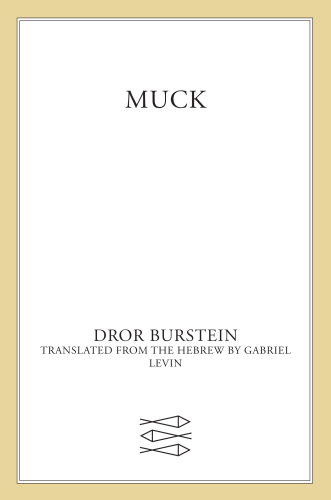
Muck
A Novel
کتاب های مرتبط
- اطلاعات
- نقد و بررسی
- دیدگاه کاربران
نقد و بررسی

September 1, 2018
Set in Jerusalem in neither the biblical past nor the politically inflamed, gas-mask present but an eerie projection of one over the other, Burstein's novel centers on the persecution of the poet/prophet Jeremiah for warning of the city's destruction.It's bad enough that Jeremiah gets tossed in a lethal mud (or muck) pit for putting Jerusalem's idol-loving population in a cranky mood; he also gets whacked in the head with his computer keyboard by a famous literary critic. Jeremiah's chief nemesis proves to be his boyhood friend Mattaniah, a tattooed would-be poet whose publishing rate isn't hurt by his being the son of the slain king of Judah. Through a series of troublesome successions, the unfit Mattaniah is made to become King Zedekiah. His great promises for the future include stopping the glaciers from melting and eliminating the use of plastic bags. As for that Babylonian army circling Jerusalem? No worries. As we recently saw with Jo Nesbø's Macbeth, it's not uncommon for novelists and dramatists to employ modern dress to freshen old tales and make them relevant. But Burstein's employment of the device is different. With its trippy overlapping of eras, settings, styles, and sensibilities, the book's dense narrative seems to unfold under a constant fog. Influenced by such masterworks as Philip Roth's scabrous Sabbath's Theater, Joseph Heller's satirical Catch-22, and the modernist works of Thomas Pynchon, the book is alternately hilarious (dig those talking dogs) and gripping in its treatment of the power of words. Ultimately, Burstein delivers page-turning suspense that gains resonance through its relevance to contemporary Israel.Israeli novelist Burstein's audacious reimagining of events leading to the siege of Jerusalem is a dazzling and dizzying triumph.
COPYRIGHT(2018) Kirkus Reviews, ALL RIGHTS RESERVED.

October 22, 2018
According to the rabbis, the time of Jewish prophecy ended long ago; Burstein’s richly inventive novel challenges this notion by setting the story of prophet Jeremiah in an Israel that is simultaneously then (the reign of the last kings of Judah) and now (the Babylonians have tanks; the Jerusalemites go into exile via light rail). Jeremiah, a failed poet with a dead sister and a vegan mother, doesn’t want to prophesy exile and destruction, especially since the last king is his childhood friend and fellow poet, but what can he do? The place is epically corrupt: children are sold like chickens to be slaughtered (in imagery reminiscent of Nazi gas “showers”), everything runs on bribes, people disappear into prisons, and even the architecture is barbaric and garish. It’s hard not to read this as a parable for today’s Israel and the struggle over Palestine. Near the end, Jeremiah is thrown into a pit: he emerges covered in the titular muck, “Godless, without angels, without prophecy... the pit remained within him.” Burstein (Kin) may not be hopeful, but in this long, tangled, and occasionally obscure novel, he has found a way to speak, as prophets and novelists do, of present, past, and future, what was and what might be.

October 15, 2018
Divided into three parts--"Jehoiakim," "Jehoiachin," and "Zedekiah"--this retelling of the biblical story of Jeremiah starts off with a hilarious interlude between the literary critic Broch and the erstwhile poet student Jeremiah, the prophet who foretold the destruction of Jerusalem by the Babylonians. Mattaniah, the brother of the current King of Judah and among Jeremiah's poetry circle, offers a narrative counterpoint to Jeremiah's plight. The novel is set in a quasimodern ancient Jerusalem about the time of King Nebuchadnezzar. The second section, named for the son of King Jehoiakim, culminates in the first Babylonian invasion. In the third and briefest chapter, Mattaniah, renamed Zedekiah, presides as the latest Hebrew king over the final destruction of Jerusalem. The context of subjugated cultures provides incisive commentary about state power and control, repeatedly expressed in authoritarian name changing. VERDICT Gritty realism intermixes with historical allusion, allowing the work to function on various levels. The transmogrification of ancient events into a modern context creates a gripping world of hyperrealistic abandon; recommended for intrepid readers. [See Prepub Alert, 5/4/18.]--Henry Bankhead, San Rafael P.L., CA
Copyright 2018 Library Journal, LLC Used with permission.

October 15, 2018
Two poets vie in a Jerusalem at once contemporary and biblical, with Jeremiah beginning to doubt his abilities and Mattaniah emerging as a star even as he hides a secret: his late father was king of Judah. Then Jeremiah has a vision of Jerusalem's destruction that he's loath to share with Mattaniah, who might think he's nuts.
Copyright 2018 Library Journal, LLC Used with permission.

























دیدگاه کاربران